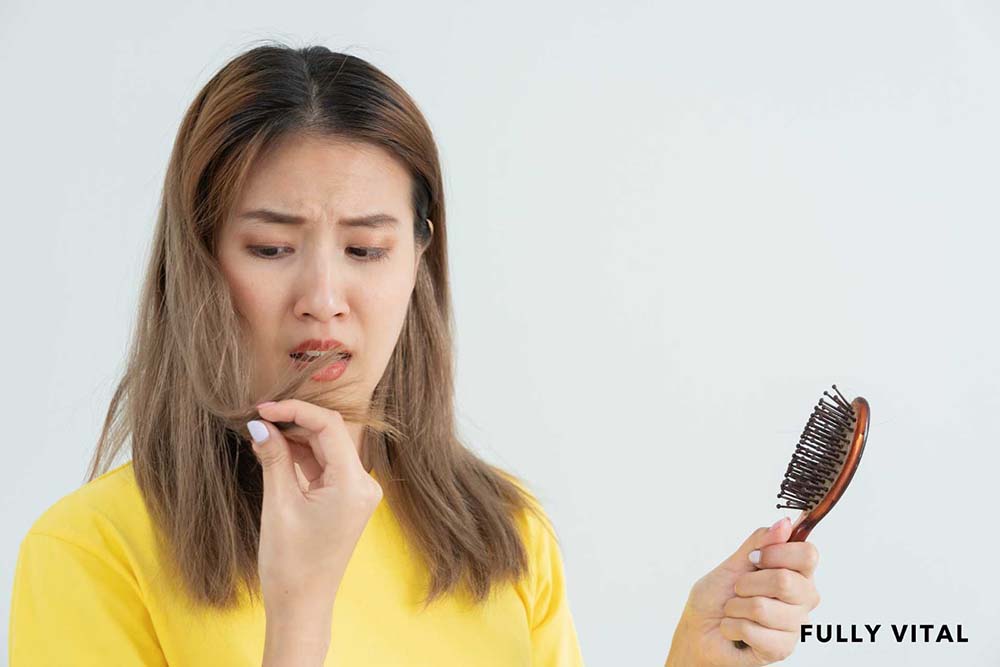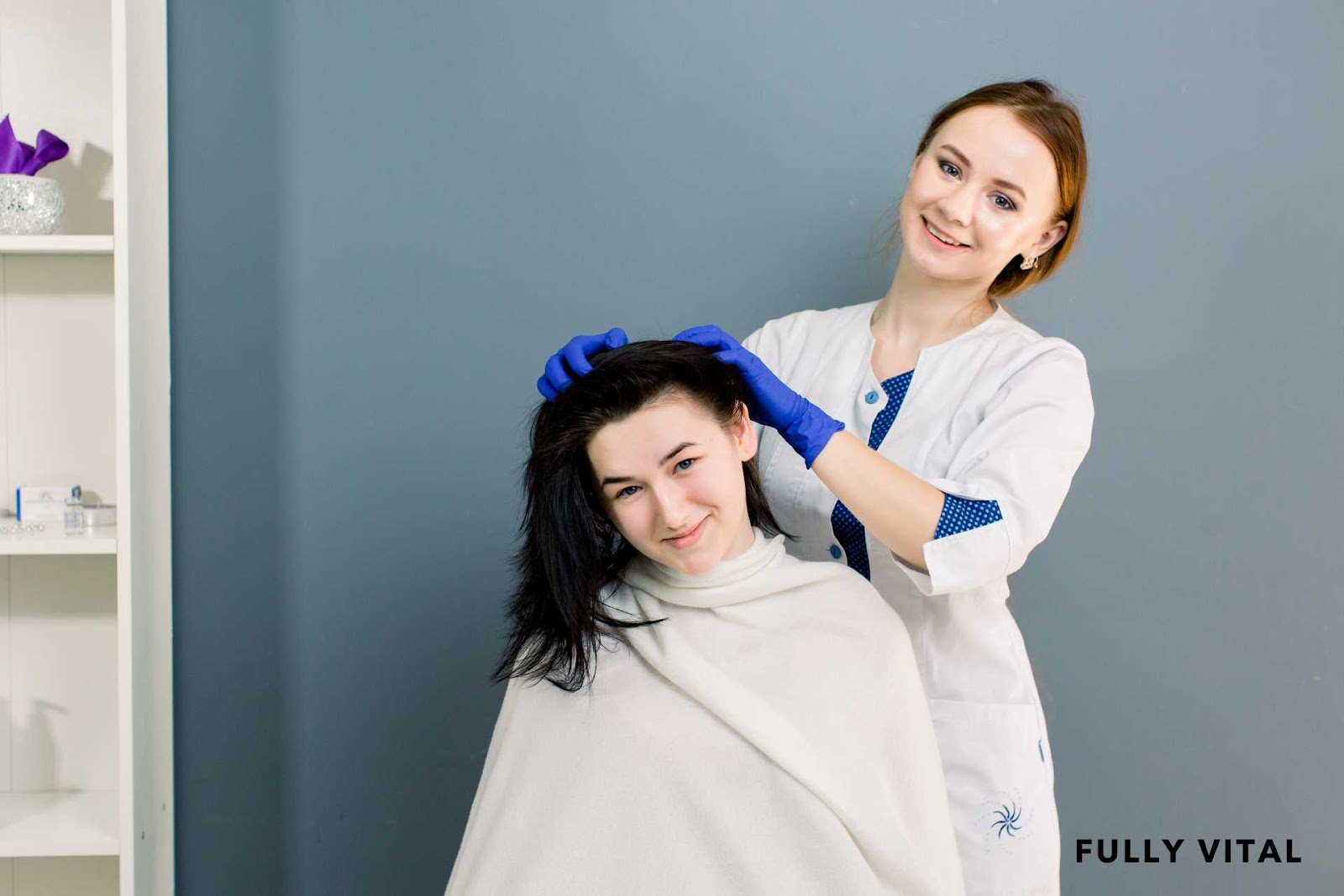
OCD Hair Loss: A Comprehensive Guide
Are you looking to boost your hair growth? As a woman with any hair type, you've probably come across the term "ocd" and wondered what it's all about.
In this article, we'll delve into the ins and outs of OCD, its importance, how it works, its benefits, downsides, and alternatives.
Let's get started with everything you need to know.

I LOVE MY HAIR NOW
FullyVital hair serum and hair vitamins made tremendous improvements in my hair. I truly love my hair now.
Dorit S.,
What Is Ocd?
Obsessive-Compulsive Disorder (OCD) is a mental health condition that affects millions of people worldwide.
It's characterized by intrusive thoughts (obsessions) and repetitive behaviors (compulsions) that individuals feel compelled to perform.
These obsessions and compulsions can consume a significant amount of time and can cause distress, impacting daily life.

Why Is Ocd Important?
Understanding OCD is crucial, especially for those seeking hair growth solutions.
Stress and anxiety, often associated with OCD, can adversely affect hair health and growth.
When the body experiences prolonged periods of stress, it can lead to hair problems like hair loss, thinning, or a slowdown in hair growth.
Managing OCD effectively can not only improve mental well-being but also have positive effects on physical health, including the health of your hair.
By addressing OCD, you can improve overall well-being, which, in turn, may positively impact hair growth.
How Does Ocd Work?
OCD operates on a loop of intrusive thoughts and compulsive behaviors.
When individuals experience distressing obsessions, they engage in specific actions or rituals to alleviate their anxiety temporarily.
However, the relief is short-lived, leading to a cycle of repeated behaviors, often interfering with their daily routines.
For example, someone with OCD may have intrusive thoughts about their hair not growing fast enough.
In response, they may feel compelled to perform a ritual, such as repeatedly checking their hair's length in the mirror or pulling on their hair, hoping it will grow faster.
These compulsions can be time-consuming and may even cause physical harm.
What Are The Benefits Of Ocd?
While OCD itself is not beneficial, managing and seeking treatment for OCD can lead to a better quality of life.
As anxiety reduces, individuals may experience improved sleep, reduced stress levels, and a better environment for promoting healthy hair growth.
It's essential to clarify that OCD itself is not beneficial. Obsessive-Compulsive Disorder (OCD) is a mental health condition that can be distressing and disruptive to a person's life.
However, the benefits discussed here are related to managing OCD effectively rather than the condition itself.
The benefits of effectively managing OCD include:
Improved Mental Well-Being
By addressing OCD through treatment, individuals can experience reduced anxiety, distress, and intrusive thoughts, leading to an overall improvement in mental well-being.
Enhanced Quality Of Life
Managing OCD can allow individuals to regain control over their thoughts and behaviors, leading to increased productivity and better overall quality of life.
Better Relationships
As OCD symptoms decrease, relationships with family, friends, and colleagues can improve.
Reduced anxiety and compulsive behaviors can lead to more meaningful connections with others.
Increased Productivity
With OCD symptoms under control, individuals can focus better on their daily tasks and responsibilities, leading to increased productivity at work, school, or in personal endeavors.
Positive Impact On Physical Health
Addressing OCD-related stress and anxiety can have positive effects on physical health, potentially reducing stress-related issues and promoting overall wellness.
Improved Self-Confidence
Successfully managing OCD can boost self-confidence and self-esteem, as individuals gain a sense of achievement and control over their lives.
Opportunity For Growth
Through therapy and coping strategies, individuals can develop valuable skills for managing anxiety and stress, leading to personal growth and resilience.
Better Sleep
As anxiety levels decrease, individuals may experience improved sleep quality, allowing for better rest and overall health.
Greater Focus On Hair Growth Goals
For women seeking hair growth solutions, managing OCD can allow them to focus more on their hair growth goals and maintain consistent hair care routines.
Are There Any Downsides To Ocd?
Yes, there are several downsides to Obsessive-Compulsive Disorder (OCD), as it is a mental health condition that can significantly impact a person's life and well-being.
Some of the main downsides include:
Reduced Quality Of Life
OCD can lead to a reduced quality of life due to the distressing and time-consuming nature of obsessions and compulsions. It can interfere with daily activities, relationships, and overall enjoyment of life.1
Interference With Daily Functioning
The intrusive thoughts and compulsive behaviors associated with OCD can disrupt a person's ability to focus on essential tasks, affecting productivity at work or school.
Emotional Distress
Individuals with OCD may experience intense anxiety, guilt, or shame related to their obsessions and compulsions. This emotional distress can be overwhelming and impact self-esteem.
Social Isolation
OCD may lead to social isolation as individuals may avoid certain situations or activities due to fear of triggers or embarrassment about their symptoms.
Negative Impact On Relationships
OCD can strain relationships with family, friends, and partners. Loved ones may struggle to understand the nature of OCD and its impact on the individual's behavior.
Physical Harm
In some cases, compulsive behaviors in OCD can lead to physical harm.
For example, excessive hand washing may cause skin damage, or hair pulling (trichotillomania) can result in hair loss and skin irritation.
Co-Occurring Conditions
OCD often coexists with other mental health conditions, such as depression, anxiety disorders, or eating disorders, which can further complicate the individual's overall well-being.
Time-Consuming Rituals
Engaging in compulsive rituals can take up a significant amount of time each day, leaving little room for other activities and interests.
Financial Burden
Seeking treatment for OCD, including therapy and medication, can involve financial costs that may add stress to the individual or their family.
Impact On Hair Growth Goals
For women seeking hair growth solutions, the anxiety and stress associated with OCD may interfere with their ability to focus on maintaining consistent hair care routines and following through with their hair growth goals.2
What Are The Alternatives To Ocd?
When referring to "alternatives to OCD," it's essential to clarify that there are no direct alternatives to the condition itself, as OCD is a specific mental health disorder.
However, there are alternative approaches and strategies that individuals can explore to manage OCD symptoms effectively.
These alternatives aim to reduce the impact of OCD on daily life and promote overall well-being.
Here are some alternatives to consider:
Therapy Options
Psychotherapy is a primary treatment approach for OCD.
Cognitive-Behavioral Therapy (CBT) is considered the most effective therapy for managing OCD symptoms.
Additionally, Exposure and Response Prevention (ERP) is a specific type of CBT often used to treat OCD.
Support Groups
Joining OCD support groups can provide a sense of community and understanding among individuals with similar experiences.
Sharing experiences and coping strategies in a supportive environment can be beneficial.
Mindfulness Practices
Mindfulness techniques, such as meditation and deep breathing exercises, can help individuals become more aware of their thoughts and feelings, reducing anxiety associated with OCD.
Self-Help Resources
Utilizing self-help books, online resources, or apps designed for OCD management can offer valuable information and coping tools.
Stress Reduction Techniques
Learning and implementing stress reduction techniques, such as yoga, exercise, or progressive muscle relaxation, can help manage anxiety associated with OCD.
Healthy Lifestyle
Maintaining a balanced and healthy lifestyle, including regular exercise, proper nutrition, and adequate sleep, can support overall well-being and reduce stress.
Creating a Structured Routine
Establishing a structured daily routine can provide a sense of predictability and control, which may help manage OCD symptoms.
Professional Guidance
Seeking guidance from healthcare professionals or mental health specialists experienced in treating OCD is essential for developing a personalized treatment plan.
Can Ocd Develop Later In Life?
As with many mental health conditions, OCD can develop at any stage of life, including later in life.
While OCD often begins during childhood, adolescence, or early adulthood, it can also manifest for the first time in older adults.
Some individuals may experience a sudden onset of OCD symptoms, while others may notice a gradual increase in obsessive thoughts and compulsive behaviors over time.
Factors that may contribute to the development of OCD in later life include:
-
Significant life changes or stressors, such as retirement, loss of a loved one, or health issues.
-
Changes in brain chemistry or neurological factors.
-
Genetic predisposition, as OCD can sometimes run in families.
-
Environmental triggers that activate latent OCD tendencies.
It's essential to seek professional evaluation and support if you or someone you know experiences new or worsening OCD symptoms later in life.
Early intervention can lead to better outcomes and improved quality of life.
Are There Natural Remedies For Managing Ocd Symptoms?
While professional treatment is crucial for effectively managing OCD, some individuals may find relief or support through natural remedies as adjunctive measures.
It's essential to understand that natural remedies are not a substitute for evidence-based treatments, such as cognitive-behavioral therapy (CBT) and medication.
However, they may complement traditional therapies and promote overall well-being.
Some natural remedies and lifestyle changes that may help manage OCD symptoms include:
-
Regular Exercise: Physical activity can release endorphins, which are natural mood enhancers that can reduce stress and anxiety.
-
Supplements: Some studies suggest that certain supplements, such as N-acetylcysteine (NAC) and inositol, may have potential benefits for OCD symptoms. However, it's essential to consult with a healthcare professional before trying any supplements.
-
Adequate Sleep: Getting enough restful sleep is vital for mental health and can help reduce anxiety and stress.
It's crucial to discuss any natural remedies or supplements with a healthcare professional before incorporating them into your OCD management plan.
Can Stress-Triggered Hair Loss Be Mistaken For Ocd-Related Hair Pulling?
Stress can be a significant factor in both stress-triggered hair loss and OCD-related hair pulling (trichotillomania). However, there are distinct differences between the two conditions.
Stress-Triggered Hair Loss:
-
Also known as telogen effluvium, stress-triggered hair loss is a temporary condition that results from physical or emotional stressors disrupting the hair growth cycle.
-
It often leads to diffuse hair shedding and thinning across the scalp.
-
Hair loss occurs due to more hairs than usual entering the resting (telogen) phase and falling out prematurely.
-
This condition typically resolves on its own once the underlying stressor is addressed or managed.
OCD-Related Hair Pulling (Trichotillomania):
-
Trichotillomania is a mental health condition characterized by a compulsive urge to pull out one's hair, leading to noticeable hair loss and potentially causing significant distress.
-
Hair pulling in trichotillomania is usually localized to specific areas, such as the scalp, eyebrows, or eyelashes.
-
It's considered a repetitive behavior driven by the need to relieve anxiety or tension, rather than a physiological response to stress.
While both stress-triggered hair loss and trichotillomania may result from stress, the underlying mechanisms and treatment approaches differ.
If you're experiencing hair loss or hair pulling, it's essential to consult with a healthcare professional or a mental health specialist to determine the appropriate diagnosis and treatment plan.
How Long Does Ocd Treatment Typically Last?
The duration of OCD treatment can vary depending on several factors, including the severity of symptoms, individual response to treatment, and the chosen therapeutic approach. OCD treatment is typically considered in two main categories: psychotherapy and medication.
Psychotherapy (Cognitive-Behavioral Therapy - CBT):
-
CBT is the gold standard for treating OCD and involves working with a trained therapist to identify and modify negative thought patterns and behaviors.
-
The length of CBT treatment can range from several weeks to several months, with regular sessions scheduled to achieve treatment goals.
Medication:
-
Selective serotonin reuptake inhibitors (SSRIs) are commonly prescribed medications for OCD treatment.
-
The duration of medication therapy can vary from a few months to more extended periods, depending on the individual's response and symptom improvement.
It's essential to note that OCD treatment is often not a one-time intervention but a process of learning and implementing coping strategies.
Regular follow-ups with healthcare professionals and therapists may be necessary to maintain progress and prevent relapse.
Can Ocd Be Hereditary?
Yes, there is evidence suggesting a genetic component to OCD. Individuals with a family history of OCD have a higher risk of developing the condition themselves.
However, genetics is not the sole factor in OCD development, and environmental influences also play a role.
Key points about OCD and genetics:
-
Having a close family member, such as a parent or sibling, with OCD increases the risk of developing the disorder.3
-
Specific genetic variations may contribute to the susceptibility to OCD, but the exact genetic mechanisms are complex and not fully understood.
-
Environmental factors, such as traumatic events or chronic stress, can interact with genetic predisposition to trigger or exacerbate OCD symptoms.
While genetics may increase the likelihood of developing OCD, it is not a deterministic factor.
Many individuals with a family history of OCD do not develop the disorder, while others with no known family history can still experience OCD symptoms.
Early detection, accurate diagnosis, and appropriate treatment are essential for managing OCD effectively, regardless of its genetic component.
Experience The Power Of Youthful Hair With Fully Vital!Discover the Science: Fully Vital brings you hair growth products backed by powerful science. Our advanced formulas are carefully crafted to slow down and reverse the aging effects on your precious locks.
Embrace Your Hair's Journey: Every strand tells a story, and we're here to make it a beautiful one. Embrace your hair's journey with Fully Vital and enjoy a lifetime of healthy, lustrous locks. Remember, your hair's potential is limitless with Fully Vital. Experience the transformation today! |
Final Thoughts On Ocd
Understanding Obsessive-Compulsive Disorder (OCD) is crucial for women of all hair types seeking to stimulate hair growth.
While OCD itself is not beneficial, managing its symptoms can lead to a better quality of life, reducing stress and anxiety that may impact hair health.
At Fully Vital, we are dedicated to helping you maintain a healthy relationship with your locks.
Our variety of hair growth products is designed to combat the aging effects on hair, supporting its vitality and strength.
Take the first step towards achieving your hair growth goals and embrace the beauty of your locks with Fully Vital.
Frequently Asked Questions About Ocd
Can OCD impact hair growth directly?
While OCD itself may not directly affect hair growth, the stress and anxiety it causes can lead to hair loss or hair thinning over time.
Is OCD a common condition?
Yes, OCD is relatively common, affecting approximately 2.2% of the global population.
It can manifest at any age, but symptoms often start during adolescence or early adulthood.
Can hair growth products worsen OCD symptoms?
Hair growth products, when used as directed, are not known to worsen OCD symptoms.
However, it's essential to consult with a healthcare professional if you have concerns.
Are there any successful treatments for OCD?
Yes, OCD is treatable.
Cognitive-behavioral therapy (CBT) and medication are commonly used to manage OCD symptoms effectively.
Can stress-reduction techniques help with hair growth?
Absolutely. Lowering stress levels through techniques like meditation or deep breathing exercises can promote healthy hair growth.
Is OCD genetic?
There is evidence suggesting a genetic component to OCD, but environmental factors also play a role in its development.
Can children experience OCD?
Yes, children and adolescents can develop OCD. It may present differently in younger individuals compared to adults.
Can OCD go away on its own?
OCD symptoms may fluctuate over time, but it's unlikely to disappear without appropriate treatment.
Can OCD be mistaken for other conditions?
Yes, OCD can sometimes be misdiagnosed or mistaken for other anxiety-related disorders.
Seeking professional evaluation is essential for accurate diagnosis.
Can lifestyle changes help manage OCD?
In some cases, lifestyle changes, such as regular exercise and maintaining a balanced routine, can complement OCD treatment.
Sources:
-
Mayo Clinic. (2020, March 11). Obsessive-compulsive Disorder (OCD) - Symptoms and Causes. Mayo Clinic; Mayo Clinic. https://www.mayoclinic.org/diseases-conditions/obsessive-compulsive-disorder/symptoms-causes/syc-20354432
-
Victoria State Government. (2012). Obsessive compulsive disorder. Vic.gov.au; Better Health Channel. https://www.betterhealth.vic.gov.au/health/conditionsandtreatments/obsessive-compulsive-disorder
-
Chacon, P., Bernardes, E., Faggian, L., Batistuzzo, M., Moriyama, T., Miguel, E. C., & Polanczyk, G. V. (2018). Obsessive-compulsive symptoms in children with first degree relatives diagnosed with obsessive-compulsive disorder. Revista Brasileira de Psiquiatria, 40(4), 388–393. https://doi.org/10.1590/1516-4446-2017-2321







